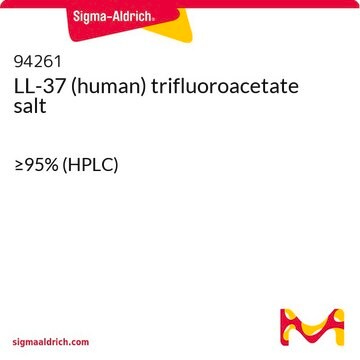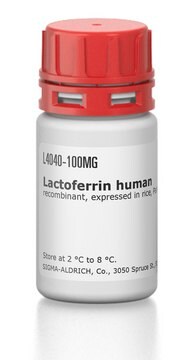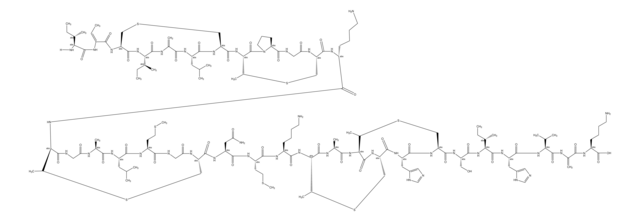L1290
Lactoferricin B, fragment 4-14 trifluoroacetate salt
≥95% (HPLC)
Synonym(s):
bLFC (26-36), bovine lactoferricin
Sign Into View Organizational & Contract Pricing
All Photos(1)
About This Item
Empirical Formula (Hill Notation):
C70H113N25O13S
Molecular Weight:
1544.87
MDL number:
UNSPSC Code:
12352202
NACRES:
NA.32
Recommended Products
Quality Level
assay
≥95% (HPLC)
solubility
H2O: soluble
antibiotic activity spectrum
Gram-negative bacteria
Gram-positive bacteria
mode of action
cell membrane | interferes
Storage temp.
−20°C
Amino Acid Sequence
Arg-Arg-Trp-Gln-Trp-Arg-Met-Lys-Lys-Leu-Gly
General description
Chemical structure: peptide
Application
Lactoferricin B, fragment 4-14 trifluoroacetate salt has been used to study effect of lactoferricin on cell proliferation of human colon cancer cells. It has been used in study of ultraviolet light-mediated DNA damage in human colon cancer cells.
Biochem/physiol Actions
Antibiotic peptide in colostrum and milk that protects from bacterial infection at mucosal surfaces.
Lactoferricin B also suppresses liver and lung metastasis in murine melanomas and lymphomas. In addition, it causes cell death in human leukemic and carcinoma cell lines. It is effective against Escherichia coli, Salmonella enteritidis, Klebsiella pneumoniae, Proteus vulgaris, Yersinia enterocolitica, Pseudomonas aeruginosa, Campylobacter jejuni, Staphylococcus aureus, Streptococcus mutans, Corynebacterium diphtheriae, Listeria monocytogenes and Clostridium perfringens.
Storage Class
11 - Combustible Solids
wgk_germany
WGK 3
flash_point_f
Not applicable
flash_point_c
Not applicable
ppe
Eyeshields, Gloves, type N95 (US)
Choose from one of the most recent versions:
Certificates of Analysis (COA)
Lot/Batch Number
Don't see the Right Version?
If you require a particular version, you can look up a specific certificate by the Lot or Batch number.
Already Own This Product?
Find documentation for the products that you have recently purchased in the Document Library.
C Freiburghaus et al.
Journal of dairy science, 92(6), 2477-2484 (2009-05-19)
Food components modify the risk of cancer at a large number of sites but the mechanism of action is unknown. In the present investigation, we studied the effect of the peptide lactoferricin derived from bovine milk lactoferrin on human colon
C Freiburghaus et al.
Journal of dairy science, 95(10), 5552-5560 (2012-08-21)
Treatment of Caco-2 cells with the peptide lactoferricin(4-14), results in reduction of the growth rate by prolongation of the S phase of the cell cycle. Lactoferricin(1-25) is formed in the gut by cleavage from lactoferrin and the bioactive amino acids
Liv Tone Eliassen et al.
International journal of cancer, 119(3), 493-500 (2006-03-31)
Antimicrobial peptides have been shown to exert cytotoxic activity towards cancer cells through their ability to interact with negatively charged cell membranes. In this study the cytotoxic effect of the antimicrobial peptide, LfcinB was tested in a panel of human
W Bellamy et al.
The Journal of applied bacteriology, 73(6), 472-479 (1992-12-01)
A physiologically diverse range of Gram-positive and Gram-negative bacteria was found to be susceptible to inhibition and inactivation by lactoferricin B, a peptide produced by gastric pepsin digestion of bovine lactoferrin. The list of susceptible organisms includes Escherichia coli, Salmonella
Our team of scientists has experience in all areas of research including Life Science, Material Science, Chemical Synthesis, Chromatography, Analytical and many others.
Contact Technical Service








